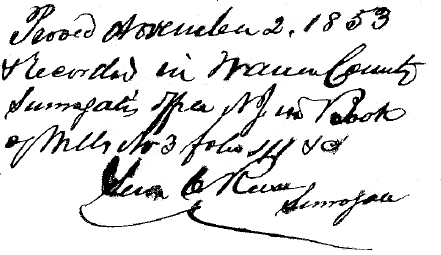This will is dated September 3, 1853. Henry was obviously in failing health, having no expectation of being around on April 1, 1854 to deliver the deed for the riverfront property to John I. Blair. Indeed he passed away 7 weeks later, on October 21, 1853, aged 77y 6m 18d.
The pdf this transcription is taken from is a scan of the original hand-written will. It was not written by Henry, most likely by his lawyer, but the signatures at the bottom by Henry and his witnesses prove that it is the original.
Henry and his wife Mary Ferguson, who pre-deceased him by over a quarter of a century, had 11 children spaced over 21 years, all but one of whom survived to adulthood. In addition to the 9 named in the will there was a daughter Elizabeth, baptized as Betsy @ St. James Episcopal Church, who died a few weeks shy of 14 (10/23/1811-9/7/1825), and Mary, the youngest, who was just 17 months old when their mother died (6/2/1826, 9 months after Betsy). Mary grew up and married a local young man named David Ribble in 1846 at age 21. They had 2 children, Albert (born 8/30/1847) and Sarah (7/20/1849). The winter following Sarah's birth, David rushed Mary to Sandyston Hospital some 25 miles away near Newton, where she died at age 25 of "congestion fever" (pneumonia) on February 5. That left David the single parent of a toddler and an infant. But not for long - Albert died of the same cause in the same hospital 3 weeks later.
Henry was an astute businessman from a young age, with a well-honed sense of the values of things. When he wrote this will, Sarah Ribble had just turned 4 years old. The $800 he left her, plus 14 years of compound interest, was a reasonable estimate of what would have been Mary's fair share of the estate. Henry notably did not give Mary's share to her widower David Ribble, since it was a near certainty that he would remarry (he did), and the bulk of Mary's share would go to children not descended from Henry Albertson. No, it had to be bequeathed directly to Sarah, under the best possible assurance that she would receive her mother's fair share.
About that public vendue. The winning bidder was a man named Jacob D. Addis. In the 1850 census Addis was listed as a laborer on William Craig's farm, located immediately to the east of Henry Albertson's. Addis was born in 1822, a contemporary of Henry's youngest surviving daughter Susannah. He was married to a woman named Margaret, and together they had a 1 year old son. Jacob D. Addis was one of the 3 witnesses to Henry's will. He was a friend of the family! There are reasons to question whether this vendue might not have been rigged, a legal sham to fulfill the terms of Henry's will, with Addis bidding Albertson money.
Why would Henry, wheeler dealer extroardinaire, not come up with some financial arrangement on his own that would keep the property he inherited from his parents in the family? Three words - John Insley Blair. Blair was a railroad magnate. He lived in a mansion on the grounds of Blair Academy some 5 miles away in Blairstown, a town that was named after him not only while he was still alive but still in his 30's! He also had a smaller home on Valley St. in Delaware, at the base of Blair's Knob, with a back yard that reached up to the peak and beyond, where it bordered Henry's estate. That's how Blair's Knob got it's name, by the way. It was literally John I. Blair's knob. He owned it!
In the early 1850's, Blair decided that Delaware NJ would make a nice destination for city dwellers from the east. He built railroad branches to serve it, and to make doubly sure it would make a nice destination, he bought the town! He imposed a real estate grid on Delaware that was aligned to his planned railroad line but at odds with the existing property lines (Mill St on this 1874 map was later the boundary between Eagle's Nest Camp and Hunter's Lodge, and we know of at least 1 property line further south that ran parallel to Mill St. before Mr. Blair arrived). Blair's purchases were mostly in the flat part of town lying between Valley St. and the Delaware River. Still, during Henry's waning months there was a lot of Blair cash chasing Delaware property. I suspect that Henry revised his will 7 weeks before his death in the expectation that Blair would bid on his land, driving up the price and enriching his heirs beyond belief. If so, Henry miscalculated. The property on the plateau above Delaware held no fascination for John Insley Blair.

